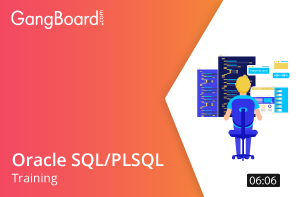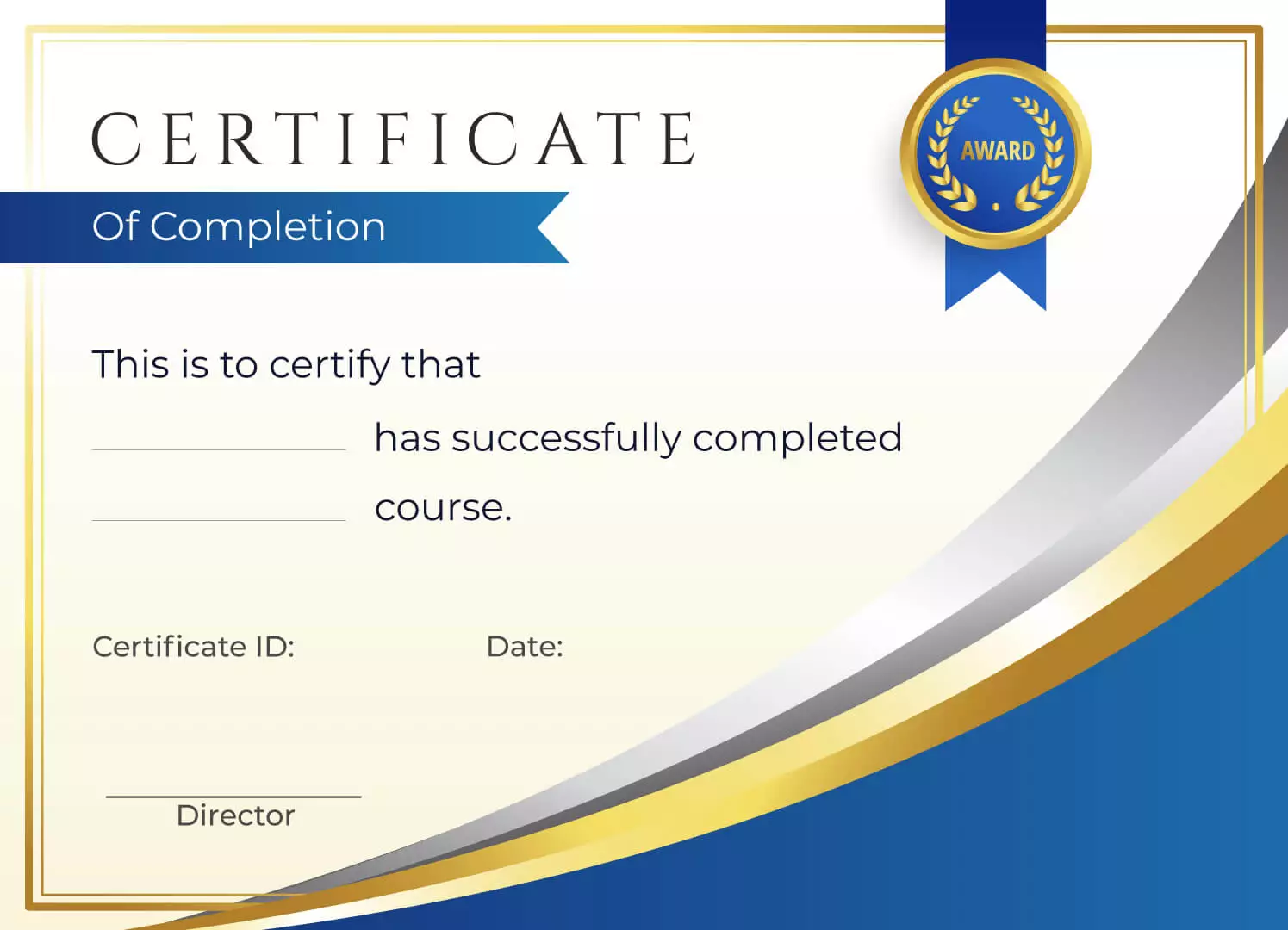Oracle SQL/PLSQL Certification Online Training
GangBoard helps you gain proficiency with Oracle SQL PL SQL Certification Training so you clear the Oracle SQL PL SQL Developer Certified Associate Exam with ease. Some concepts of Oracle SQL PL SQL Training Course that you will learn with live exercises are the management of database application, procedures, triggers, packages, data security, etc.
What you'll learn from this course?
- Introduction to SQL
- Introduction to PL/SQL
Upcoming Batches for Oracle SQL/PLSQL Online Training
Our Oracle SQL/PLSQL Online Course give students the opportunity to take classes on your flexible timings. Choose from a number of batches as per your convenience. If you got something urgent to do, reschedule your batch for a later time. The classes can be attended to at any place and any time as per your choice.
Course Price at
Discount Price:₹ 17,000You Save: ₹ 3,000 (15% OFF)
Can’t find a batch you were looking for?
Enroll Now Pay Later Request a BatchCourse Syllabus of Oracle SQL/PLSQL Online Training
Introduction to SQL
- Listing the features of Oracle Database 11g
- Discussing the basic design, theoretical and physical aspects of a relational database
- Describing the development environments for SQL
- Describing Oracle SQL Developer, Describing the data set used by the course
- Retrieving Data Using the SQL SELECT Statement
- Listing the capabilities of SQL SELECT statements.
- Generating a report of data from the output of a basic SELECT statement
- Using arithmetic expressions and NULL values in the SELECT statement
- Using Column aliases
- Using concatenation operator, literal character strings, alternative quote operator, and the DISTINCT keyword
- Displaying the table structure using the DESCRIBE command
- Restricting and Sorting Data
- Writing queries with a WHERE clause to limit the output retrieved Using the comparison operators and logical operators
- Describing the rules of precedence for comparison and logical operators
- Using character string literals in the WHERE clause
- Writing queries with an ORDER BY clause to sort the output
- Sorting output in descending and ascending order
- Using the Substitution Variables
- Using Single-Row Functions to Customize Output
- Differentiating between single row and multiple row functions
- Manipulating strings using character functions
- Manipulating numbers with the ROUND, TRUNC and MOD functions
- Performing arithmetic with date data
- Manipulating dates with the date functions
- Using Conversion Functions and Conditional Expressions
- Describing implicit and explicit data type conversion
- Using the TO_CHAR, TO_NUMBER, and TO_DATE conversion functions
- Nesting multiple functions
- Applying the NVL, NULLIF, and COALESCE functions to data
- Using conditional IF THEN ELSE logic in a SELECT statement
- Reporting Aggregated Data Using the Group Functions
- Using the aggregation functions in SELECT statements to produce meaningful reports
- Using AVG, SUM, MIN, and MAX function
- Handling Null Values in a group function
- Creating queries that divide the data in groups by using the GROUP BY clause
- Creating queries that exclude groups of date by using the HAVING clause
- Displaying Data from Multiple Tables
- Writing SELECT statements to access data from more than one table
- Joining Tables Using SQL:1999 Syntax
- Viewing data that does not meet a join condition by using outer joins
- Joining a table by using a self join
- Creating Cross Joins
- Using Sub-queries to Solve Queries
- Using a Subquery to Solve a Problem
- Executing Single-Row Sub-queries
- Using Group Functions in a Sub-query
- Using Multiple-Row Subqueries
- Using the ANY and ALL Operator in Multiple-Row Sub-queries
- Using the SET Operators
- Describing the SET operators
- Using a SET operator to combine multiple queries into a single query
- Using UNION, UNION ALL, INTERSECT, and MINUS Operator
- Using the ORDER BY Clause in Set Operations
- Manipulating Data
- Adding New Rows to a Table Using the INSERT statement
- Changing Data in a Table Using the UPDATE Statement
- Using DELETE and TRUNCATE Statements
- Saving and discarding changes with the COMMIT and ROLLBACK statements
- Implementing Read Consistency
- Using the FOR UPDATE Clause
- Using DDL Statements to Create and Manage Tables
- Categorizing Database Objects
- Creating Tables using the CREATE TABLE Statement Describing the data types
- Describing Constraints
- Creating a table using a subquery
- Altering and Dropping a table
- Creating Other Schema Objects
- Creating, modifying, and retrieving data from a view
- Performing Data manipulation language (DML) operations on a view
- Dropping a view
- Creating, using, and modifying a sequence
- Creating and dropping indexes
- Creating and dropping synonyms
Introduction to PL/SQL
- What is PL/SQL
- PL/SQL Environment
- Benefits of PL/SQL
- Overview of the Types of PL/SQL blocks
- Create and Execute a Simple Anonymous Block
- Generate Output from a PL/SQL Block
- iSQL*Plus as PL/SQL Programming Environment
- Declaring PL/SQL Identifiers
- Identify the Different Types of Identifiers in a PL/SQL subprogram
- Use the Declarative Section to Define Identifier
- List the Uses for Variables
- Store Data in Variables
- Declare PL/SQL Variables
- Writing Executable Statements
- Describe Basic Block Syntax Guidelines
- Use Literals in PL/SQL
- Customize Identifier Assignments with SQL Functions
- Use Nested Blocks as Statements
- Reference an Identifier Value in a Nested Block
- Qualify an Identifier with a Label
- Use Operators in PL/SQL
- Use Proper PL/SQL Block Syntax and Guidelines
- Interacting with the Oracle Server
- Identify the SQL Statements You Can Use in PL/SQL
- Include SELECT Statements in PL/SQL
- Retrieve Data in PL/SQL with the SELECT Statement
- Avoid Errors by Using Naming Conventions When Using Retrieval and DML Statements
- Manipulate Data in the Server Using PL/SQL
- The SQL Cursor concept
- Use SQL Cursor Attributes to Obtain Feedback on DML
- Save and Discard Transactions
- Writing Control Structures
- Control PL/SQL Flow of Execution
- Conditional processing Using IF Statements
- Conditional Processing CASE Statements
- Handle Nulls to Avoid Common Mistakes
- Build Boolean Conditions with Logical Operators
- Use Iterative Control with Looping Statements
- Working with Composite Data Types
- Learn the Composite Data Types of PL/SQL Records and Tables
- Use PL/SQL Records to Hold Multiple Values of Different Types
- Inserting and Updating with PL/SQL Records
- Use INDEX BY Tables to Hold Multiple Values of the Same Data Type
- Using Explicit Cursors
- Cursor FOR Loops Using Sub-queries
- Increase the Flexibility of Cursors By Using Parameters
- Use the FOR UPDATE Clause to Lock Rows
- Use the WHERE CURRENT Clause to Reference the Current Row
- Use Explicit Cursors to Process Rows
- Explicit Cursor Attributes
- Cursors and Records
- Handling Exceptions
- Handling Exceptions with PL/SQL
- Predefined Exceptions
- Trapping Non-predefined Oracle Server Errors
- Functions that Return Information on Encountered Exceptions
- Trapping User-Defined Exceptions
- Propagate Exceptions
- Use The RAISE_APPLICATION_ERROR Procedure To Report Errors To Applications
- Creating Stored Procedures
- Describe the block structure for PL/SQL stored procedures
- Invoke a stored procedure/function from different tools
- Call a stored procedure with host variables from iSQL*Plus, Forms, Java, C, etc
- Invoke a stored procedure from an anonymous block or another stored procedure
- List the CREATE OR REPLACE PROCEDURE syntax
- Identify the development steps for creating a stored procedure
- Use the SHOW ERRORS command
- View source code in the USER_SOURCE dictionary view
- Creating Stored Functions
- Describe stored functions
- List the CREATE OR REPLACE FUNCTION syntax
- Identify the steps to create a stored function
- Execute a stored function
- Identify the advantages of using stored functions in SQL statements
- Identify the restrictions of calling functions from SQL statements
- Remove a function
- Creating Packages
- List the advantages of packages
- Describe packages
- Show the components of a package Diagram the visibility of constructs within a package
- Develop a package
- Create the package specification
- Declare public constructs
- Create the package body
- Using More Package Concepts
Are you Looking for Customized Syllabus
We are also providing customized syllabus to the students according to their needs and projects requirements for the cons
Request a CallProgram Features
IT Professionals as Trainers
Learning a technology with a professional who is well expertise in that solve 60% of your needs.
Fully Hands-on Training
We support any training should be more practical apart from theoretical classes. So, we always gives you hands-on training.
Affordable Fees
We are dead cheap in fees. We are having options to make the payment in instalments as well if needed.
10000+ old students to believe
We satisfied 10000+ students from the day we started GangBoard. Take a look of our old student’s video reviews and it says all.
Counselling by Experts
If you are in dilemma to choose a course, we are having experts in counselling team to help you with perfect projection of your career.
Own Course Materials
We have every course material to understand which is prepared by our trainers and we will share with you after session completes.
FAQ
Request more information
Our Advisor will get in touch with you in the next 24 Hours
Oracle SQL/PLSQL Exams & Certification
GangBoard Certification is Accredited by all major Global Companies around the world. We provide after completion of the theoretical and practical sessions to fresher’s as well as corporate trainees.
Our certification at GangBoard is accredited worldwide. It increases the value of your resume and you can attain leading job posts with the help of this certification in leading MNC’s of the world. The certification is only provided after successful completion of our training and practical based projects.
5000
Total Number of Reviews
4.57
Aggregate Review Score
97%
Course Completion Rate
At End of our Oracle SQL/PLSQL Online Course, you will be assigned to work real-time projects. Once you completed the project with expected results we will verify and issue a globally recognised Oracle SQL/PLSQL Course Completion Certificate from GangBoard.
Oracle SQL/PLSQL Training Reviews
Average Ratings
Activity from April 2018
4.8
Course Reviews
Activity from Last Year
1596 ReviewsAverage Ratings
GangBoard Total Reviews in all Medium
21,596 ReviewsFiyaz
Software Engineer
GangBoard is the best place for learning software IT Courses. They provide unique course materials, a curriculum plan and well-trained instructors along with 24/7 support. The course content prepared GangBoard is extremely inline with real-time client specifications. Thanks to the whole GangBoard team.
Jeevika
Software Engineer
I had an Amazing Learning Experience from GangBoard. I am very much thankful to my trainer for explaining in a great way and developing my interest further in this topic. It's really a great opportunity for me to take Training in GangBoard. Thanks to the entire team of GangBoard.
Lohit
Software Engineer
I have done Training in GangBoard. It's really an awesome learning experience. All the concepts were covered without any compromise. The instructor was very well determined and Focussed on Clear Examples. It's completely awesome. Thanks to GangBoard.
Aalia
Software Engineer
Thanks to GangBoard for providing excellent Software IT Courses. I would like to say thanks to the support team for there advice and help whenever I faced any issues. They are always ready to help you to solve the issues. I like this approach from GangBoard.
Nisha
Software Engineer
I took Training with GangBoard. It is an amazing experience. Excellent course structure, Experienced faculty, superb support team. They are always with the success of student carrier, very prompt service they are committed to what they promised.











 +1 201-949-7520
+1 201-949-7520 +91-9707 240 250
+91-9707 240 250